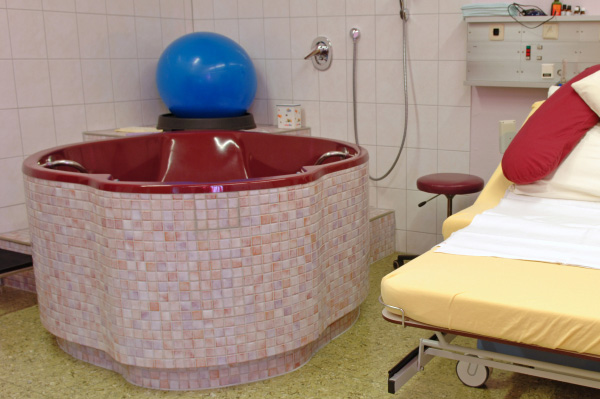Are you considering a water birth for your delivery? Water births are literally births that happen in the water of a tub. Although it might not be the birth you have seen on television, water births offer some great benefits to moms who are looking for a natural alternative to pain relief and a more gentle transition for baby going from the womb to this brand new world.

Not all births involve the mother laying on her back, feet in the air and a doctor between her legs. In fact, women who want a more natural birth often choose to labor in alternative positions such as squatting or on an exercise ball. Another option is water birth.
Moms who water birth sit in a tub filled with warm water during the end phase of labor (they may also sit in it during other parts of labor as well for pain relief). So why do moms choose this form of birthing? "I chose waterbirth because I wanted a natural childbirth, and I felt that the water would help with pain relief. I also knew that the buoyancy of water could help me change positions more easily during labor. Research I read indicated that waterbirth was the most gentle transition for the baby as well, and that appealed to me," said Karen Shopoff Rooff, a certified personal trainer (www.balancepft.com) in Austin, Texas.
Water births can be had either at home or in some birthing centers. Some hospitals also have tubs for laboring in water as well.
Pain relief
Can laboring in water really reduce the pain of labor? Naturopathic physician Amanda Levitt, ND, of Hamden, Connecticut, says that water relaxes the laboring mother so she can better handle the pain of labor. The effect of warm water does provide some pain relief as well as relaxes the back and legs where muscle spasms can be felt during labor, Levitt says.
However, it's not going to make birth painless. "My patients who have had water births have been pleased with the process. Birthing is a painful process, no matter if it is on land or in water," says Levitt. She said that ultimately less than 10 percent of moms who water birth request pain medication.
Ami Burns, a Lamaze Certified Childbirth Educator and DONA Certified Doula who had a water birth, says that it's important to listen to your body when laboring. "I think of water labor/birth as 'nature's narcotic.' It doesn't take the pain of contractions away, but it reduces the pain without any of the potential side effects of medication. Like anything else with birth, I encourage women to think of water birth as an option then decide what's best for them in labor," says Burns.
Easily change positions
Being able to change positions is one of the great benefits of water birth, since the position changes are eased with the boyancy of water. "Buoyancy allows for greater mobility during labor, [so the mom is] able to find comfortable positions for laboring through contractions and for pushing," explained Levitt, adding that the greater freedom of movement is also empowering.
Rooff said that being able to move, she believes, helped her birth a 9 lb baby without any tearing. "I loved being able to move so easily in the water; I shifted around a lot as the baby moved down the birth canal. I also loved having warm water poured on my back as I labored-- that was extremely relaxing. I believe that having a waterbirth allowed my body to stretch to its fullest, and the warm water increased the suppleness of my perineum so that I had no tearing," says Rooff.
Gentle transition
When a baby is born, they sometimes require a slap on the back before they beginning breathing (yes that's for real). It's also a big change from the warm comfort of the womb to the cool air of a delivery room. Water birth eases that transition, since baby is moved from womb to warm water to mother. "It is a more peaceful transition to be born into warm water in a dimly lit room. Within seconds, because of air touching the skin and cord, the physiological system is signaled, and the baby easily begins to use its lungs for breathing, without being slapped or roughly stimulated," says Levitt.
Tell us: Did you have a waterbirth? Share your experience below!